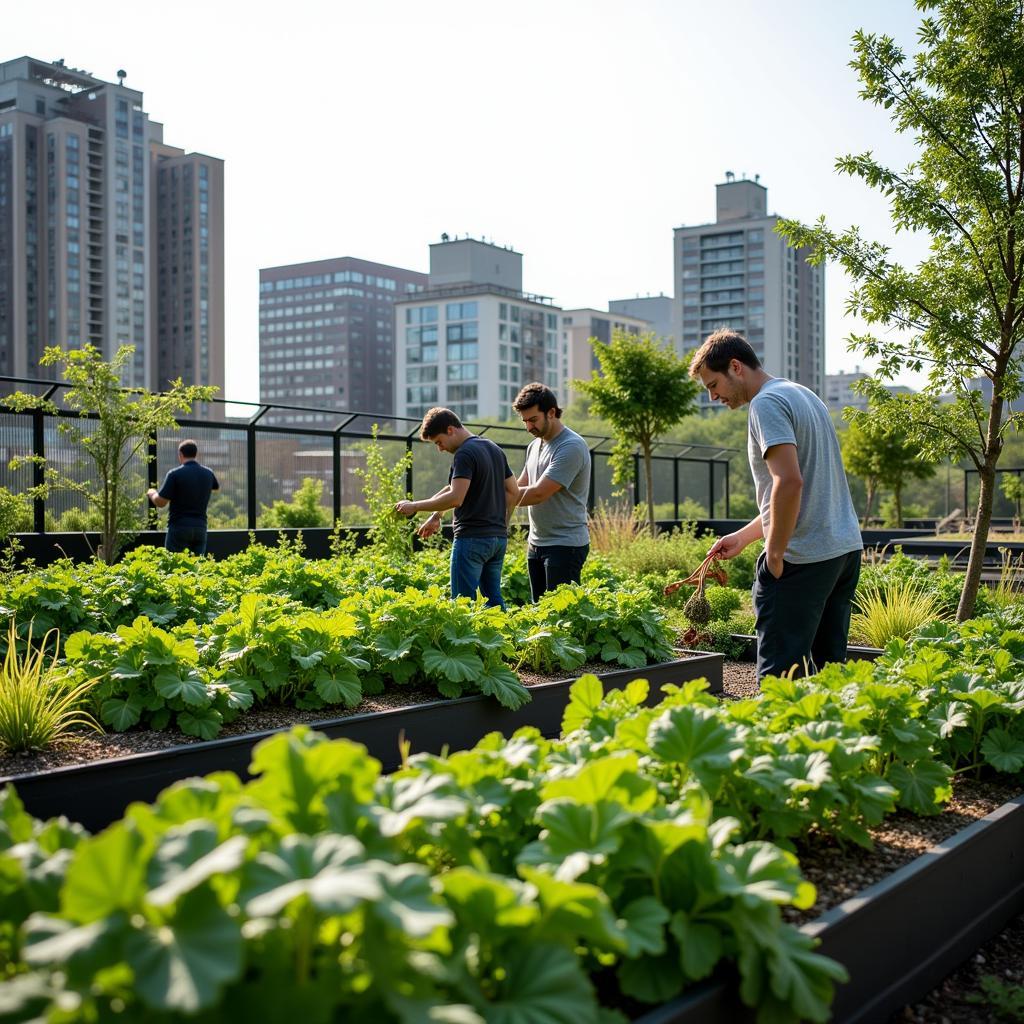The topic of urban farming and food security has become increasingly prevalent in IELTS Writing Task 2 examinations, appearing roughly 3-4 times annually since 2019. As cities continue to grow and food security challenges persist, understanding how to effectively write about urban agriculture solutions is crucial for IELTS candidates.
Let’s analyze one recent exam question that exemplifies this topic:
Some people believe that urban farming initiatives can help solve food security problems in cities. To what extent do you agree or disagree with this view?
Analysis of the Question
- Topic: Urban farming and food security
- Task type: Opinion (Agree/Disagree)
- Key elements to address:
- Urban farming initiatives
- Food security challenges
- Effectiveness of urban farming as a solution

Sample Essay 1 (Band 8.5)
Urban agriculture has emerged as a promising solution to address how to address the challenges of food security in urban areas. I strongly agree that urban farming initiatives can significantly contribute to alleviating food insecurity in cities, although they should be part of a comprehensive approach.
Urban farming offers several compelling advantages in addressing food security challenges. Firstly, it dramatically reduces the distance between food production and consumption, ensuring fresher produce while minimizing transportation costs and environmental impact. For instance, rooftop gardens in Singapore provide fresh vegetables to local communities, demonstrating the viability of urban agriculture. Secondly, these initiatives empower city residents to participate in food production, fostering community resilience and reducing dependence on external food sources.
Moreover, urban farming initiatives can enhance food security through innovative technologies. Vertical farming and hydroponics systems enable significant food production in limited spaces, maximizing yield per square meter. Cities like Tokyo have successfully implemented these technologies, producing substantial quantities of vegetables in urban settings. These methods also offer year-round production capabilities, reducing seasonal vulnerabilities in food supply.
However, urban farming alone cannot completely resolve food security issues. Cities must integrate these initiatives with broader food security strategies, including improved distribution systems and waste reduction programs. Additionally, government support through policies and funding is essential for scaling up urban farming projects to achieve meaningful impact.
In conclusion, while urban farming presents a powerful tool for enhancing food security, its success depends on implementation within a comprehensive framework. Cities should actively promote and support these initiatives while recognizing their role as part of a larger solution to food security challenges.
Sample Essay 2 (Band 6.5)
I agree that urban farming can help with food problems in cities. This is becoming more important as cities get bigger and food becomes more expensive.
One good thing about urban farming is that people can grow their own food. When people grow vegetables on their balconies or in community gardens, they spend less money on food. For example, in my city, some families save money by growing tomatoes and herbs at home. Also, urban farming makes fresh food easier to get, which is good for people’s health.
Another benefit is that urban farming is good for the environment. When food is grown in cities, trucks don’t need to drive far to deliver it to shops. This means less pollution and cheaper food. Some modern buildings now have gardens on their roofs, which helps save energy and grow food at the same time.
However, there are some problems with urban farming. Not everyone has space to grow food, and some people don’t know how to farm. Also, cities need to make rules about where people can grow food to make sure it’s safe and clean.
In conclusion, I think urban farming can help with food problems, but it needs support from governments and communities to work well. More people should learn about urban farming and try to grow some food if they can.
Analysis of Band Scores
Band 8.5 Essay Analysis:
- Task Response (9): Comprehensive coverage with clear position
- Coherence/Cohesion (8): Logical organization with effective paragraphing
- Lexical Resource (8.5): Sophisticated vocabulary use (“alleviating,” “viable,” “comprehensive framework”)
- Grammar (8.5): Complex structures used accurately
Band 6.5 Essay Analysis:
- Task Response (6.5): Basic development of ideas
- Coherence/Cohesion (6.5): Simple but clear organization
- Lexical Resource (6): Limited but adequate vocabulary
- Grammar (7): Mix of simple and complex structures
Key Vocabulary
- food security (n.) /fuːd sɪˈkjʊərɪti/ – reliable access to sufficient food
- urban agriculture (n.) /ˈɜːbən ˈæɡrɪkʌltʃə/ – farming in cities
- hydroponics (n.) /ˌhaɪdrəˈpɒnɪks/ – soil-less plant cultivation
- sustainable (adj.) /səˈsteɪnəbl/ – environmentally maintainable
- resilience (n.) /rɪˈzɪliəns/ – ability to recover from difficulties
For additional practice on this topic, consider writing about these related questions:
- How can technology improve urban farming efficiency?
- Should governments make urban farming mandatory for new buildings?
Share your practice essays in the comments for feedback and discussion!